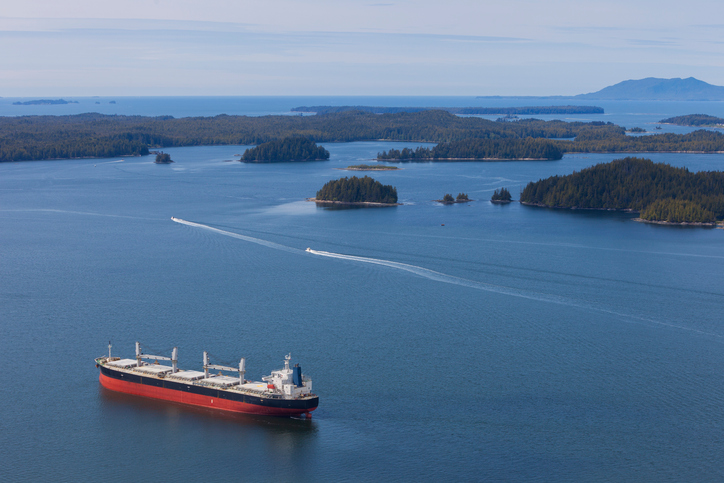The federal Liberals have introduced a new bill that aims to ban oil tanker traffic from the B.C. coast and impose penalties for potential violators.

Bill C-48, the Oil Tanker Moratorium Act, would put a stop to crude oil tanker traffic on the B.C. North Coast and prohibit oil tankers carrying crude and persistent oils as cargo from stopping, loading or unloading at ports in northern B.C.
The government revealed its intention to table the bill in 2015 as a way to formalize the existing moratorium for crude oil tankers. As it stands today, there is an existing voluntary Tanker Exclusion Zone, which has been in place since 1985.
The moratorium also makes official a non-binding motion the House of Commons passed in 2010 after being put forward by the NDP.
The area included in the moratorium runs from the Canada/United States border in the north to the northern tip of Vancouver Island adjacent with the mainland.
The bill would, however, allow some vessels carrying less than 12,500 metric tonnes of crude or persistent oil to operate in the area. This would ensure northern communities can receive critical shipments of necessary oils, the government said in a news release.
- 2021 heat dome fuelled by climate change, intensified wildfire risk: study
- B.C. introduces legislation recognizing Haida Gwaii Indigenous title
- Whale experts confident B.C. orca calf will survive, find family if rescue plan succeeds
- Plastic production cap still contentious as Ottawa set to host treaty talks
Canada’s Minister of Transport Marc Garneau, who introduced the bill on Friday, says the proposal would protect the coasts and improve marine safety.
“The Government of Canada is committed to demonstrating a clean environment and a strong economy can go hand-in-hand,” Garneau said in the release. “Tabling this legislation is another step towards fulfilling our promise to formalize the tanker moratorium on British Columbia’s north coast.”
In November 2016, Prime Minister Justin Trudeau announced a $1.5-billion ocean protection plan that would improve oil spill response on the B.C. coast and create a “world-leading marine safety system.”
The bill also proposes penalties for violations that could reach up to $5 million.
B.C.’s potential liquefied natural gas industry would not be affected by the bill. The B.C. government currently has proposals for 19 LNG ports along the coast, many located in the moratorium area.
The oil products that are included in the moratorium include partially upgraded bitumen, synthetic crude oil, pitch, slack wax and bunker C fuel oil.
Oil products not included are liquefied natural gas (LNG), gasoline, naphtha, jet fuel and propane.
The legislation does provide room for amendments where “refined petroleum products can be removed from the list on the basis of science and environmental safety.” Products could also be added.
The B.C. Coastal First Nations (CFN) applauded the government’s announcement, saying it addresses most of their concerns on tanker traffic.
“We fought hard against Enbridge’s Northern Gateway project. This law puts an end to any future oil pipeline and tanker project in our territories,” CFN board chair Patrick Kelly said in a news release. “Our coast is no place for oil pipelines and tankers. They are a threat to our culture, environment and economy.”
But not all indigenous groups are on board with the legislation. The Eagle Spirit Energy Project, a First Nations-led pipeline proposal from Alberta through B.C., condemned the government’s announcement, calling it “ill-conceived.”
The project’s Chief’s Council, represented by indigenous communities in northern B.C., said in a news release:
“To be clear; there has been insufficient consultation for the proposed Tanker Moratorium and it does not have our consent. As Indigenous peoples, we want to preserve the right to determine the types of activities that take place in our territories and do not accept that the federal government should tell us how to preserve, protect, and work within our traditional territories.”
The government says it has consulted by many indigenous groups, industry stakeholders and communities across Canada in formulating Friday’s legislation.





Comments